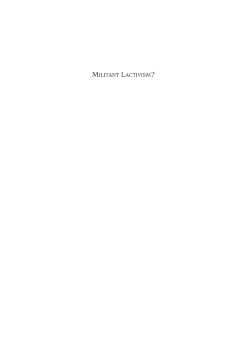
Additional Information
Book Details
Abstract
Following networks of mothers in London and Paris, the author profiles the narratives of women who breastfeed their children to full term, typically a period of several years, as part of an 'attachment parenting' philosophy. These mothers talk about their decision to continue breastfeeding as 'the natural thing to do': 'evolutionarily appropriate', 'scientifically best' and 'what feels right in their hearts'. Through a theoretical focus on knowledge claims and accountability, the author frames these accounts within a wider context of 'intensive parenting', arguing that parenting practices – infant feeding in particular – have become a highly moralized affair for mothers, practices which they feel are a critical aspect of their 'identity work'. The book investigates why, how and with what implications some of these mothers describe themselves as 'militant lactivists' and reflects on wider parenting culture in the UK and France. Discussing gender, feminism and activism, this study contributes to kinship and family studies by exploring how relatedness is enacted in conjunction to constructions of the self.
Charlotte Faircloth is a Leverhulme Trust Early Career Fellow with the Centre for Parenting Culture Studies in the School of Sociology, Social Policy and Sociological Research at the University of Kent.
SHORTLISTED FOR THE 2014 BSA PHILIP ABRAMS MEMORIAL PRIZE
“This is an attentive ethnography of women in London and Paris who are members of the international breastfeeding support organisation La Leche League (LLL)… The book is written in a clear and engaging way and can be recommended to students and scholars interested in kinship and family studies, as well as for those looking for a good anthropological study on contemporary motherhood.” · Social Anthropology/Anthropologie sociale
“This is a captivating, original, and methodologically sound study, which will make an important contribution to anthropological work on contemporary motherhood. It deserves to be much more widely read, however, by scholars in many other disciplines and outside the academy.” · Ellie Lee, University of Kent
“The cross-cultural dimension is one of the things that make this book unique and especially valuable…Overall, the book is on an important topic, based on sound research. This is a major contribution to scholarship on parenting, and a compelling study of a subject now in the forefront of public debate.” · Linda Layne, Rensselaer Polytechnic Institute/University of Cambridge
